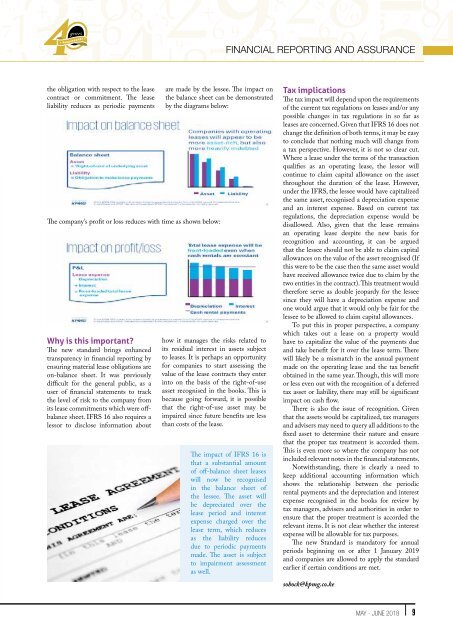May-June-issue
Create successful ePaper yourself
Turn your PDF publications into a flip-book with our unique Google optimized e-Paper software.
Financial Reporting and Assurance<br />
the obligation with respect to the lease<br />
contract or commitment. The lease<br />
liability reduces as periodic payments<br />
are made by the lessee. The impact on<br />
the balance sheet can be demonstrated<br />
by the diagrams below:<br />
The company’s profit or loss reduces with time as shown below:<br />
Why is this important?<br />
The new standard brings enhanced<br />
transparency in financial reporting by<br />
ensuring material lease obligations are<br />
on-balance sheet. It was previously<br />
difficult for the general public, as a<br />
user of financial statements to track<br />
the level of risk to the company from<br />
its lease commitments which were offbalance<br />
sheet. IFRS 16 also requires a<br />
lessor to disclose information about<br />
how it manages the risks related to<br />
its residual interest in assets subject<br />
to leases. It is perhaps an opportunity<br />
for companies to start assessing the<br />
value of the lease contracts they enter<br />
into on the basis of the right-of-use<br />
asset recognised in the books. This is<br />
because going forward, it is possible<br />
that the right-of-use asset may be<br />
impaired since future benefits are less<br />
than costs of the lease.<br />
The impact of IFRS 16 is<br />
that a substantial amount<br />
of off-balance sheet leases<br />
will now be recognised<br />
in the balance sheet of<br />
the lessee. The asset will<br />
be depreciated over the<br />
lease period and interest<br />
expense charged over the<br />
lease term, which reduces<br />
as the liability reduces<br />
due to periodic payments<br />
made. The asset is subject<br />
to impairment assessment<br />
as well.<br />
Tax implications<br />
The tax impact will depend upon the requirements<br />
of the current tax regulations on leases and/or any<br />
possible changes in tax regulations in so far as<br />
leases are concerned. Given that IFRS 16 does not<br />
change the definition of both terms, it may be easy<br />
to conclude that nothing much will change from<br />
a tax perspective. However, it is not so clear cut.<br />
Where a lease under the terms of the transaction<br />
qualifies as an operating lease, the lessor will<br />
continue to claim capital allowance on the asset<br />
throughout the duration of the lease. However,<br />
under the IFRS, the lessee would have capitalized<br />
the same asset, recognised a depreciation expense<br />
and an interest expense. Based on current tax<br />
regulations, the depreciation expense would be<br />
disallowed. Also, given that the lease remains<br />
an operating lease despite the new basis for<br />
recognition and accounting, it can be argued<br />
that the lessee should not be able to claim capital<br />
allowances on the value of the asset recognised (If<br />
this were to be the case then the same asset would<br />
have received allowance twice due to claim by the<br />
two entities in the contract). This treatment would<br />
therefore serve as double jeopardy for the lessee<br />
since they will have a depreciation expense and<br />
one would argue that it would only be fair for the<br />
lessee to be allowed to claim capital allowances.<br />
To put this in proper perspective, a company<br />
which takes out a lease on a property would<br />
have to capitalize the value of the payments due<br />
and take benefit for it over the lease term. There<br />
will likely be a mismatch in the annual payment<br />
made on the operating lease and the tax benefit<br />
obtained in the same year. Though, this will more<br />
or less even out with the recognition of a deferred<br />
tax asset or liability, there may still be significant<br />
impact on cash flow.<br />
There is also the <strong>issue</strong> of recognition. Given<br />
that the assets would be capitalized, tax managers<br />
and advisers may need to query all additions to the<br />
fixed asset to determine their nature and ensure<br />
that the proper tax treatment is accorded them.<br />
This is even more so where the company has not<br />
included relevant notes in the financial statements.<br />
Notwithstanding, there is clearly a need to<br />
keep additional accounting information which<br />
shows the relationship between the periodic<br />
rental payments and the depreciation and interest<br />
expense recognised in the books for review by<br />
tax managers, advisers and authorities in order to<br />
ensure that the proper treatment is accorded the<br />
relevant items. It is not clear whether the interest<br />
expense will be allowable for tax purposes.<br />
The new Standard is mandatory for annual<br />
periods beginning on or after 1 January 2019<br />
and companies are allowed to apply the standard<br />
earlier if certain conditions are met.<br />
sobock@kpmg.co.ke<br />
MAY - JUNE 2018 9

















